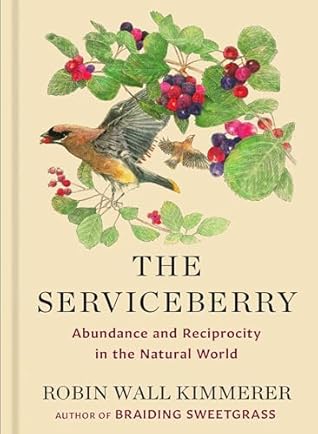More on this book
Community
Kindle Notes & Highlights
Read between
October 30 - November 2, 2025
Instead of changing the land to suit their convenience, they changed themselves. Eating with the seasons is a way of honoring abundance, by going to meet it when and where it arrives.
When we speak of these not as things or natural resources or commodities, but as gifts, our whole relationship to the natural world changes. In a traditional Anishinaabe economy, the land is the source of all goods and services, which are distributed in a kind of gift exchange: one life is given in support of another. The focus is on supporting the good of the people, not only an individual. Receiving a gift from the land is coupled to attached responsibilities of sharing, respect, reciprocity, and gratitude—of which you will be reminded.
Recognizing “enoughness” is a radical act in an economy that is always urging us to consume more.
Ecopsychologists have shown that the practice of gratitude puts brakes on hyperconsumption. The relationships nurtured by gift thinking diminish our sense of scarcity and want. In that climate of sufficiency, our hunger for more abates and we take only what we need, in respect for the generosity of the giver. Climate catastrophe and biodiversity loss are the consequences of unrestrained taking by humans. Might cultivation of gratitude be part of the solution?
If our first response to the receipt of gifts is gratitude, then our second is reciprocity: to give a gift in return.
Gratitude and reciprocity are the currency of a gift economy, and they have the remarkable property of multiplying with every exchange, their energy concentrating as they pass from hand to hand, a truly renewable resource.
Materials move through ecosystems in a circular economy and are constantly transformed. Abundance is created by recycling, by reciprocity.
If the Sun is the source of flow in the economy of nature, what is the “Sun” of a human gift economy, the source that constantly replenishes the flow of gifts? Maybe it is love.
In a gift economy, wealth is understood as having enough to share, and the practice for dealing with abundance is to give it away. In fact, status is determined not by how much one accumulates, but by how much one gives away. The currency in a gift economy is relationship, which is expressed as gratitude, as interdependence and the ongoing cycles of reciprocity. A gift economy nurtures the community bonds that enhance mutual well-being; the economic unit is “we” rather than “I,” as all flourishing is mutual.
The prosperity of the community grows from the flow of relationships, not the accumulation of goods.


